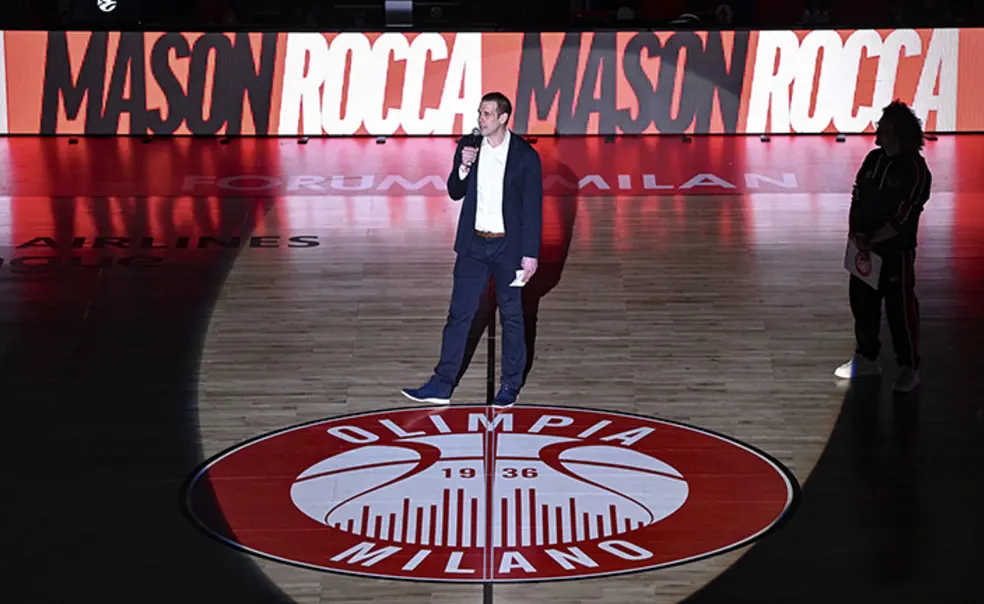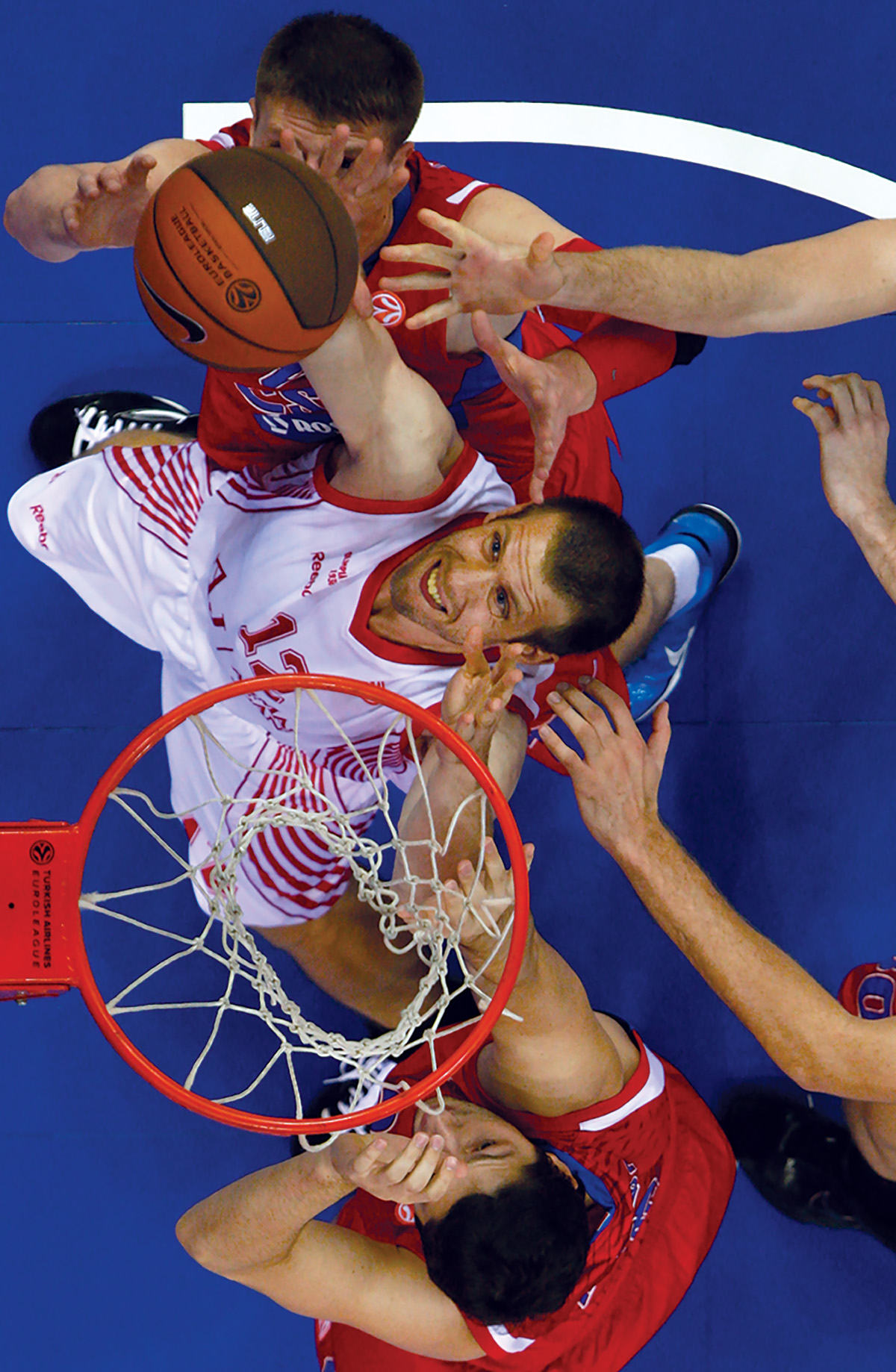Mason Rocca ’00 Honored for Pro Basketball Career in Italy
The former Tiger center is also making his mark in esports as a national-champion cyclist
In April, Mason Rocca ’00 traveled to Italy, where one of his former professional basketball teams, Olimpia Milano, inducted him into its Hall of Fame in an on-court ceremony. Rocca served as team captain for Olimpia Milano, one of the top teams in Europe, which made the finals of the Italian basketball league in three of his four seasons playing there, from 2008-12.
Other members of the team’s Hall of Fame include Naismith Basketball Hall of Famers Bill Bradley ’65 and Bob McAdoo.
“The style in Europe really served me well with team play,” said Rocca. “You had to be able to contribute in lots of ways — defense, passing, rebounding — the same as at Princeton.”
Highlighting the 6-foot-8 Rocca’s 14-year career was a stint as the starting center for Team Italy in the 2006 World Championships, which included a victory over Team China and its star center Yao Ming, plus a game against a LeBron James-led U.S. team in which Italy led at halftime.
“That was the pinnacle of my career,” said Rocca. “It was incredibly special to represent Italy at the World Championships and play against the top players in the world.”
Rocca also became a dual citizen and fluent in Italian. “My first motivation was to understand what the head coach was yelling at me,” he said with a laugh.
William & Mary head coach Brian Earl ’99, a former Ivy League Player of the Year and Princeton teammate, pointed to toughness as a key to Rocca’s success. “He was impervious to physicality,” said Earl. “Height and toughness don’t always go together, and he had it.”
Gabe Lewullis ’99, another All-Ivy player renowned for his game-winning shot as a freshman against defending national champion UCLA, called Rocca an excellent teammate you could always rely on. “Such a tenacious rebounder and strong as an ox,” said Lewullis. “If you needed a rebound, he was going to get it.”
Lewullis saw Rocca play in Italy and noted that his former teammate became a huge fan favorite. “Mason was a gritty player, and things just took off for him overseas,” Lewullis said.
These days, Rocca is competing at the highest levels of a much different sport. In 2022, he won the USA Cycling Esports National Championship.
Rocca began cycling in the latter stages of his playing career in Milan when he got to know the owners of DeRosa, a high-end cycling company, and received a custom-made bicycle.
“It was kind of like giving a 16-year-old with a learner’s permit a Ferrari Testarossa,” said Rocca. “I had this incredible bike, and I said I’ve really got to learn how to ride this thing.”
Rocca rode first as a way to stay in shape, but it soon became an outlet for his competitiveness. “My ankle has been through the wringer so I couldn’t play basketball anymore, but I could still ride,” he said. When the pandemic hit, virtual racing took off, and Rocca gravitated to it instantly.
“You don’t have to worry about crashing and can do it from the comfort of your own home,” said Rocca, an Evanston, Illinois-based father of five who has served as interim head of school at the nearby Baker Demonstration School for the past two years. “I was hooked from the beginning.”
The sport, which involves riding a stationary bike on a simulated course with changing terrains and avatars, also appealed to Rocca’s background as an electrical engineering major.
“There are lots of numbers and algorithms based on your height and weight involved in how you pace yourself,” said Rocca. “It uses my engineering background and that part of my brain.”
Remarkably similar to outdoor racing, Rocca’s National Championship victory involved riding a 51.5-mile course with grueling uphill stretches and beating of field of 27 riders, including top-notch cyclists from across the country. His winning time was 2:06:13.
A big benefit of racing from home was having his family upstairs cheering him on as they watched the race live on YouTube. “My kids would come to games in Italy but I’m so locked in that I’m not paying attention,” said Rocca. “But here it was really cool to share the experience and hear them.”
Rocca sees parallels between his basketball career and cycling success. “In my professional basketball career, it wasn’t until I was halfway through that I noticed I’d get an advantage when my opponent was tired and I wasn’t tired. That was when I could get an extra rebound or a fast-break layup,” said Rocca. “I trained that strength to make sure I could keep using it, and it’s the same concept in a race.”
“That’s typical of him to succeed by sheer will,” said Earl. “Mason gave a lot with his body over the years and is someone you knew would pull through in the end. He just always went full out.”
Looking back on his Princeton basketball days, Rocca said his most memorable game was a storied 1999 win at the Palestra dubbed “Black Tuesday” by Penn fans. Princeton rallied from a 27-point deficit with 15 minutes left to beat the Quakers 50-49.
“As we started to whittle their lead down, the gym got quieter and quieter, and you could start to hear our small-but-mighty fan section get louder and louder,” said Rocca. “It was the best example of how anything can happen... and never give up.”
Earl called the game “one of the most memorable in my life” and noted that Rocca — who scored 13 points during the comeback and seemed to grab every rebound — played an integral role. “We kind of had PTSD and couldn’t believe what happened [early in the game], but we were just not going to pack it in, and that’s where he excelled.”
Lewullis added, “Mason played like he was possessed.”











No responses yet